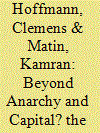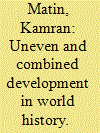| Srl | Item |
| 1 |
ID:
183468


|
|
|
|
|
| Summary/Abstract |
The drylands of the Middle East have been long seen not only as unfavourable to life, but also and relatedly, socio-politically fragile. Fraught with myths of eternal ‘ethnic’, ‘sectarian’, or ‘resource conflict’, the chronic political instability of the Middle East from Afghanistan and Yemen to Iraq and Syria has been often seen as intrinsic to a scarce ‘nature’, a scorched earth, tendentially collapsing into brute violence which in its spectacular extreme has been exercised by the so-called ‘Islamic State’ (IS)
|
|
|
|
|
|
|
|
|
|
|
|
|
|
|
|
| 2 |
ID:
183473


|
|
|
|
|
| Summary/Abstract |
The Kurdish-led project of democratic confederalism in Rojava (north and north-east Syria) has emerged as an unprecedented experience in eco-feminist and anti-capitalist direct democracy with global significance and regional ramifications. There is however virtually no critical engagement with the project’s intellectual foundations in the works of Abdullah Öcalan. This paper seeks to address this gap through a sympathetic critique of Öcalan’s historical sociology of the formation and dissolution of the state. It argues that there is a theoretical tension in Öcalan’s argument. His account of the originary rise of the Sumerian state is ‘internalist’ while his analysis of subsequent state-formation processes is ‘interactive’, which highlights the crucial role of external factors and hence implicitly the decisive significance of the condition of ‘societal multiplicity’. The paper then draws on Kojin Karatani’s ‘modes of exchange’ based world history to argue that Sumerian state-formation was also fundamentally interactive occurring within and through societal multiplicity. It therefore demonstrates the need for the incorporation of societal multiplicity in the conceptualisation of democratic confederalism and the analyses of its prospects as a non-statist political community. In so doing, the paper also contributes to critical geopolitics and anarchist international theory through underlining the social history of the rise of the state and the international nature of its dissolution.
|
|
|
|
|
|
|
|
|
|
|
|
|
|
|
|
| 3 |
ID:
079486


|
|
|
|
|
| Publication |
2007.
|
| Summary/Abstract |
IR's turn towards historical sociology is yet to overcome its ahistoricism. This lack of world-historical perspective, particularly conspicuous in relation to the non-European world, and arguably IR's emergence as a discipline, can be traced back to the theoretically fateful negligence of `the international' by the classical (historical) sociology on which the contemporary critiques of the mainstream IR theory tend to draw. This article develops this argument within the context of a theoretical reappraisal of the traditional approaches to the problematique of the premodern state in Iran and proposes an alternative theoretical framework that is critically drawn on Trotsky's theory of uneven and combined development as an internationally augmented historical materialism. Thus it argues that central to the premodern state-formation in Iran were the nomadic geopolitical pressure upon, and rule over, the agrarian Iranian society which gave rise to a synergetic nomadic-sedentary relationship mediated by, and crystallized in, the military-administrative institution of uymaq. This underlay the continuous formation, disintegration and re-production of successive states characterized by centralized patrimonial arbitrary rule.
|
|
|
|
|
|
|
|
|
|
|
|
|
|
|
|